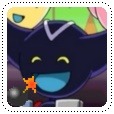#{Countryside Yokai ; Komasan}
Explore tagged Tumblr posts
Text

“SPOOKY MONTH, SPOOKY MONTH!”

“A perfect month for my pumpkin subjects~”

“Halloween means more candies!”

“Yay! More candies!”

“Others Yokai seems excited for Halloween...”

“Let’s all stay awake for Halloween night!”

“Help me, I’m surrounded by idiots...”
#{Crying Wolf ; Joshua}#{Pumpkin Märchen ; Strange Boy}#{Private second class ; Tamama}#{Messenger robo ; Bokkun}#{Countryside Yokai ; Komasan}#{The night is still young ; Wydeawake}#{Amazing hacker ; Kirai}#{The life in the Terrarium ; statut}
2 notes
·
View notes
Text
Yokai Watch: First Person Pronouns List
I’ve been meaning to do a list like this for myself and thought others might be interested, too.
Basically in the Japanese language, there are multiple first person pronouns, so more than one word for “I/Me”. Which one is appropriate to use generally depends on the context and society’s standards and the like.
And well, here I want to list which first person pronouns the characters of Yokai Watch usually use to refer to themselves, and maybe explain a little about them.
Note: At first I’ll just have a few characters listed here, but I will try to slowly add more and more to this list. This franchise has countless characters after all. Feel free to message me if you’re interested in a certain character being added.
Edit: Newest additions: Bosses introduced in Yokai Watch 1
Main Characters:
Kēta (Nate): “Ore”, written in katakana as “オレ”; Informal and masculine.
Note: While from what I understand this one would normally be considered too informal when used in anything but a casual context, in fiction it’s become a pretty standard pronoun for male characters.
Fumika (Katie): “Watashi”, written in hiragana as “わたし“; Formal and gender-neutral.
Note: While “Watashi” is considered acceptable to use for people of any gender, it’s used more by women than men, being pretty much the “standard” pronoun for women and girls, in fiction. For men, it would often be considered too formal to use in casual situations.
Inaho: “Watashi”, written in katakana as “ワタシ”; Formal and gender-neutral.
Note: See the note on Katie’s part.
Whisper: “Watakushi”, written in kanji as “私“; Very formal and gender-neutral.
Note: Unless I’m completely mishearing it, in the anime, he often seems to use the more feminine variant “Atakushi” instead? If that is true, I don’t know if it’s ad-libbed by his voice actor, or if it’s a deliberate change in the anime, and I’ve never seen him use it in the games.
Jibanyan: “Orecchi”, written in katakana and hiragana as “オレっち“; Informal and masculine.
Note: From what I understand, “Orecchi” is a variation of “Ore”, mostly used in Shizuoka?
USApyon: “Me”, written in katakana as “ミー“
Note: This is taken directly from the english word “me”, and in fiction it’s used by Westeners, most commonly Americans. Though of course this probably has very little basis in reality. I suppose it’s possible some people use it in irl cause they like how it sounds?
Supporting Characters (Yokai) :
Komasan: “Ora”, written in katakana as “オラ“; Informal and masculine.
Note: “Ora” is a regional variant of “Ore”, and in fiction has become associated with “hick” characters from “the countryside”. Also note that while it is masculine, you will usually see female characters use it as well, their lack of gender roles in speech being another thing associated with “hick” characters.
Komajiro: “Ora”, written in katakana as “オラ“; Informal and masculine.
Koma Kācchan (Koma Mom): “Ora”, written in katakana as “オラ“; Informal and masculine.
Bosses (introduced in YKW1):
Mitsumata Nozuchi (Slimamander): “Ware”, written in katakana as “ワレ”; archaic and gender-neutral.
Note: “Ware” as a first person pronoun is archaic in the sense that it is no longer really used in spoken Japanese at all, only like old expressions and words from older times, from what I understand. In fiction its usually used to signify that a character is really old, i.e. from a time where the pronoun was commonly used. Alternatively characters may use it in incantations, or villain speeches, or other similar things where characters are being kinda dramatic? It can be seen as somewhat similar to when a character in English uses “thou” and “thee” and the like, but it’s not exactly the same.
Nobosetonman (Sproink): “Ode”, written in katakana as “オデ”; (unsure)
Note: Sproink’s first person pronoun is somewhat inconsistent. In YKW 1 and Busters he uses “Washi”, written in katakana as “ワシ”, which is a somewhat informal pronoun commonly used in fiction to indicate that a character is somewhat old, usually a senior citizen, or somewhat older that middle-aged at least. In YKW2 he uses “Ore” written in katakana as “オレ”, which is informal and masculine, and more age-neutral. In YKW3 he uses the aforementioned “Ode”, which I can’t find much information on and I rarely ever see it. If I had to guess I’d say it’s probably a regional variant of “Ore”, but I do not know for sure. If I had to guess based on other characters I have seen using it, I’d say in fiction at least its associated with “big simpleton” characters, but again, I’m just speculating, it could be completely different.
Tsuraretarō-maru (SV Snaggerjag): “Washi”, written in katakana as “ワシ”; indicates old age.
Note: In fiction, the pronoun “Washi” is mainly used to indicate that a character is old, usually a senior citizen, or somewhat older that middle-aged at least. Note that this doesn’t really reflect real life, as there are a lot of places in Japan where “Washi” is used by people regardless of age. It may also be used for characters from the past where the pronoun was more common.
Oboro Nyūdō (Massiface): “Washi”, written in katakana as “ワシ” ; indicates old age.
Borei Musha (Phantasmurai): “Ore”, written in katakana as “オレ”; Informal and masculine.
Yaburekabure-inchō (Dr. Maddiman): “Watashi”, written in kanji as “私”; formal and gender-neutral.
Note: From what I understand, in fiction it’s somewhat more common for men to use “Watashi compared to real life, in the sense that normally “Watashi” would feel too formal to use in informal situations. I could be wrong though. He also briefly uses “Ware”, written in kanji as “我” while being dramatic in YKW2.
Ikakamone-gichō (Chairman McKraken): “Watashi”, written in kanji as “私”; formal and gender-neutral.
Aobee Akabee (Duwheel): “Washi”, written in hiragana as “わし”; written in katakana as “ワシ” in Yokai Watch 1 ; indicates old age.
Tsuzurachun-dayū (Chirpster): “Washi”,written in katakana as “ワシ”, also written in hiragana as “わし” once in Yokai Watch 1; indicates old age
Note: In Chirpster’s case, his overall speaking style seems to make it more clear that his usage of “Washi” comes from him literally being from an older time where the pronoun was more common. For all I know this could be the case with the others too, but yeah.
Aka Oni (Gargaros): "Washi", written in katakana as “ワシ”; indicates old age
Note: In YKW1 Gargaros used “Ore” written in katakana as “オレ”, which is informal and masculine. As of YKW2 they’re shown to use “Washi”.
Ao Oni (Ogralus): “Washi”, written in katakana as “ワシ”;
Note: In YKW1 Ogralus used “Ore” written in katakana as “オレ”, which is informal and masculine. As of YKW2 they’re shown to use “Washi”.
Kuro Oni (Orcanos): “Washi”, written in katakana as “ワシ”; indicates old age
84 notes
·
View notes